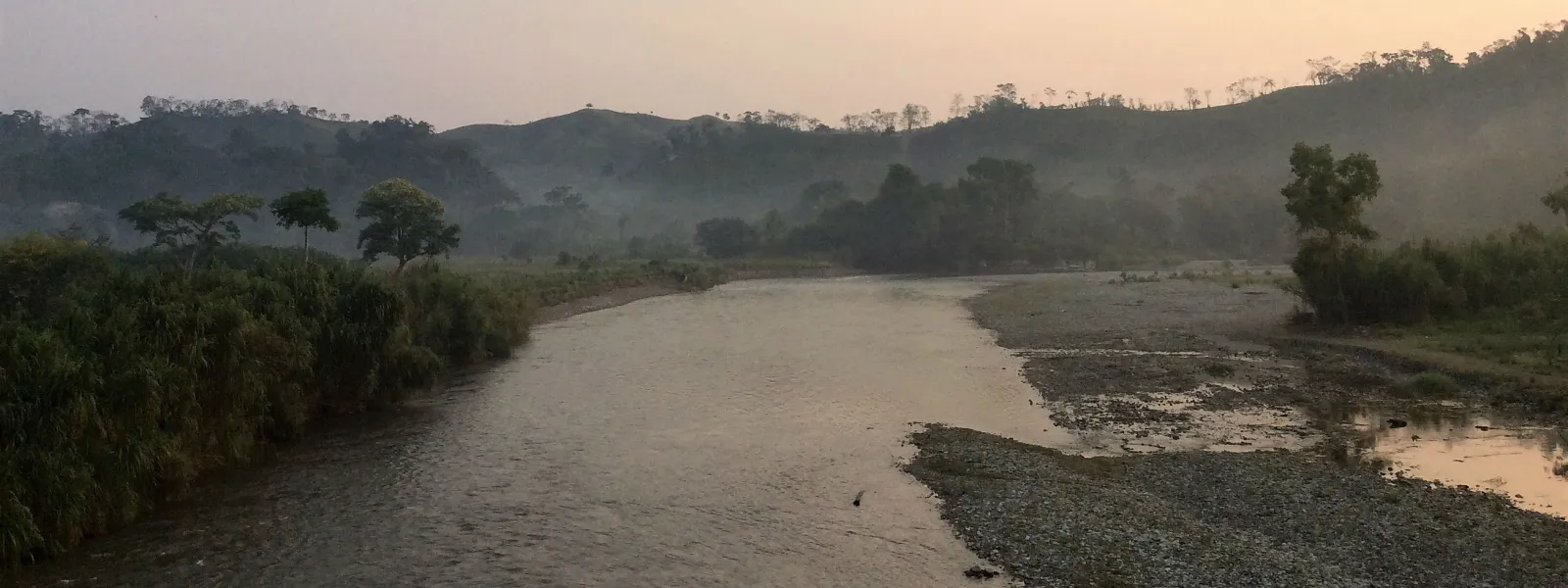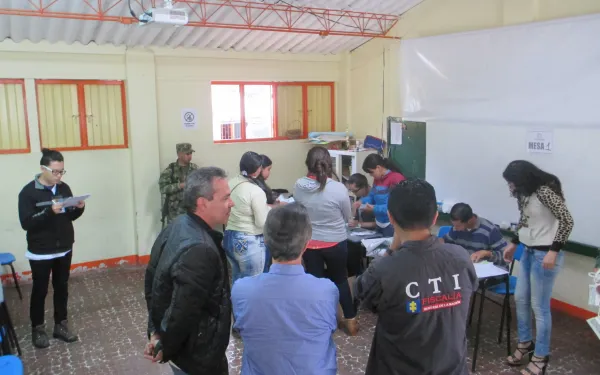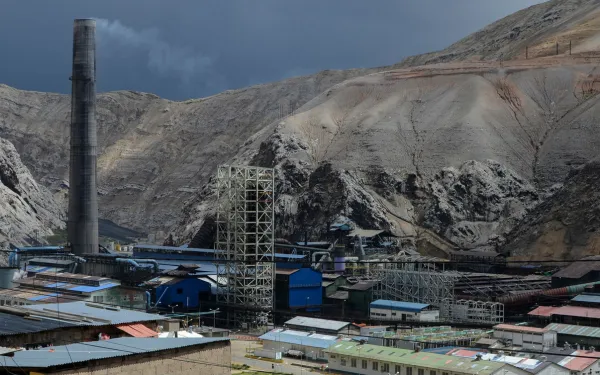
Project
Liliana Ávila /AIDAMayan women’s struggle before the Inter-American Development Bank in Guatemala
Mayan communities succeeded in getting the IDB Invest to develop a responsible exit plan after withdrawing its financing for two hydroelectric projects that negatively impacted ecosystems and the livelihoods of indigenous peoples, especially women, in the micro-region of Yichk'isis (Ixquisis).
In the struggle to defend their water, territory and way of life, indigenous Mayan communities in the Yichk'isis (Ixquisis) micro-region of northern Guatemala convinced the Inter-American Development Bank Group to withdraw its financing of two hydroelectric dams whose implementation violated their rights. The decision was also significant in that the IDB, for the first time, designed a responsible exit plan.
That historic advance was the result of the complaint that the communities filed in August 2018—with the support of AIDA, the Plurinational Ancestral Government of the Akateko, Chuj, and Q'anjob'al Native Nations, and the International Platform against Impunity. The complaint was filed with the Independent Consultation and Investigation Mechanism (MICI), the IDB Group's accountability office.
In resolving the case in September 2021, the MICI concluded that IDB Invest failed to comply with its own operational policies and safeguards, in the framework of the financing granted to the company Energía y Renovación S.A. for the implementation of the San Mateo and San Andrés hydroelectric projects.
Learn more about this achievement
In the mountains of Northwestern Guatemala, near the border with Mexico, the land is rich and fertile. Several important rivers and many other water sources feed the soil.
The residents of these mountains, many indigenous women of Mayan descent, have long depended on the waters to nourish them, to provide them with fish, as well as for agriculture, sanitation, and cooking.
But the construction of the San Mateo and San Andres dams has caused water scarcity and the contamination of rivers and other natural resources long cherished by the communities.
The near lack of water has also drastically reduced harvests, lessening the income gained from selling corn, wheat, beans, coffee, sugar cane and other products in the market. As a result, the conditions of poverty in the area have deepened.
And the risk situation is profound, particularly for women, who have played a very important role in the defense of water and territory threatened by hydroelectric projects, and are therefore victims of intimidation and stigmatization.
As guardians of their land and water, they have come to its defense and they’ll continue to prevent environmental deterioration from further harming their families.
Read our fact sheet on the case

Related projects

Victory in Colombia: Citizens Vote to Ban Mining in their Territory
On March 26, 2017, 98% of voters in Cajamarca, Colombia decisively rejected mining in their territory. The results of the referendum (or “popular consultation”) are binding under Colombian law. Now municipal authorities must issue regulations to implement the ban. AIDA was part of the legal team that advised the Cajamarca community and developed a strategy, including the referendum, to stop a proposed mine that threatens to pollute the water supply. AngloGold Ashanti was in the exploration phase of a project called La Colosa (the Collosus)—aptly named, because it would be among the world’s 10 largest open-pit gold mines, the second-largest in Latin America. In a country coming out of a 50-year civil war, the referendum is a victory not only for the environment, but also for democracy. Banning mining through popular consultation demonstrates a commitment to solving environmental conflicts in a peaceful and participatory manner. It also allows citizens to exercise their human right to have a voice in public issues that affect them—a key element of true democracy—and to safeguard their human right to a healthy environment.
Read more
Victory in Colombia: Citizens Vote to Ban Mining in their Territory
On March 26, 2017, 98% of voters in Cajamarca, Colombia decisively rejected mining in their territory. The results of the referendum (or “popular consultation”) are binding under Colombian law. Now municipal authorities must issue regulations to implement the ban. AIDA was part of the legal team that advised the Cajamarca community and developed a strategy, including the referendum, to stop a proposed mine that threatens to pollute the water supply. AngloGold Ashanti was in the exploration phase of a project called La Colosa (the Collosus)—aptly named, because it would be among the world’s 10 largest open-pit gold mines, the second-largest in Latin America. In a country coming out of a 50-year civil war, the referendum is a victory not only for the environment, but also for democracy. Banning mining through popular consultation demonstrates a commitment to solving environmental conflicts in a peaceful and participatory manner. It also allows citizens to exercise their human right to have a voice in public issues that affect them—a key element of true democracy—and to safeguard their human right to a healthy environment.
Read more
Lowering Peru’s air quality standards is regressive and harmful to public health
The government of Peru has proposed increasing the legal amount of sulfur dioxide in the air by more than 12 times and doubling the allowed level of particulate matter, substances known to cause serious health harms. The proposal ignores both scientific evidence and the government’s obligation to uphold conditions that are suitable for human life and health. Lima, Peru. Peru’s Environment Ministry has proposed new National Environmental Quality Standards for air, which would impact the health of Peruvians everywhere. The proposed standard increases by more than 12 times the limit for airborne concentrations of sulfur dioxide (SO2) and doubles the allowable amount of fine particulate matter. The increased limits ignore scientific evidence that finds these substances can cause lung problems and other illnesses, particularly among the most vulnerable populations such as people with asthma, children, and the elderly. “There is overwhelming scientific evidence to conclude that sulfur dioxide pollution poses a serious health risk, particularly when the contamination reaches high levels over short periods of time, something the proposal does not take into account,” said Anna Cederstav, co-director of the Interamerican Association for Environmental Defense (AIDA). AIDA prepared comments on the proposal that were presented to the government of Peru together with APRODEH. These pointed out that, contrary to the government’s assertion, reducing sulfur dioxide levels in the air would lead to longer life expectancy. This is because, among other reasons, sulfur dioxide also promotes the formation of PM2.5, small particulate matter that lodges in human lungs and causes acute respiratory problems such as bronchitis and pneumonia, as well as premature death. The government proposes to simultaneously double the legal limit for these extremely harmful particles. The organizations also highlighted flaws in the public consultation process. The government published the draft standard on Saturday, April 8, just before the Easter week holiday, giving only 10 working days for public comment on this critical public health issue. They also failed to make public the entire scientific and technical basis for the proposal. In so doing, the government has violated the rights to information and public participation. The comments also emphasize that the government’s proposal violates the American Convention on Human Rights and other international treaties to which Peru is a party, by failing to guarantee the human rights to life and health. While the proposed changes would impact Peru’s entire population, the residents of cities with high levels of pollution, such as La Oroya, would suffer the most severe impacts. La Oroya is an emblematic case because the metallurgical complex operating there—which has for decades been a macro-emitter of pollutants—is in the process of being sold. The government has publically acknowledged that the weakening of the air quality standards is an attempt to promote the sale of the complex. But it ignores the effects those relaxed standards would have on the people of La Oroya, who have seen significant improvements to both their air quality and their health in recent years. People affected by the pollution in La Oroya have sued the State before the Inter-American Commission on Human Rights in an attempt to protect their rights. For ten years, they have been granted precautionary measures due to the risk the pollution poses to their health and life; those measures were recently extended to additional people because the level of risk has continued. “Relaxing air quality standards to facilitate the sale of the complex and increase investment in Peru would be a setback for the protection of health and the environment, which could result in the State being held responsible before the Inter-American Court on Human Rights,” said Christian Huaylinos of APRODEH. “In addition, such actions would violate free trade agreements signed by Peru with the United States and the European Union.” Consult the comments sent to the Environment Ministry of Peru and more information on the case of La Oroya. Press contacts: Rodrigo da Costa Sales, AIDA, [email protected], +51 994767961 Christian Huaylinos, APRODEH, [email protected], +51 959 789 232
Read more